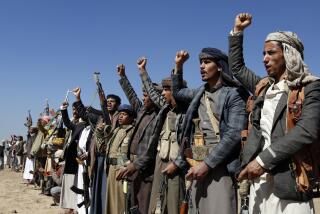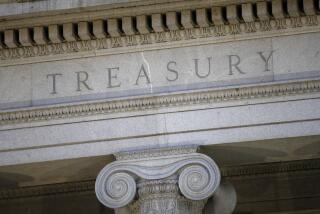U.S. Moves to Seize Assets of Main Terrorist Suspect
- Share via
WASHINGTON — The Clinton administration has launched a concerted effort to track down and freeze the financial resources of Saudi multimillionaire Osama bin Laden, whose name did not appear on a Treasury Department list of terrorists targeted for asset seizure until after the Aug. 7 bombings of two U.S. embassies in East Africa.
Bin Laden, the Saudi exile who allegedly operates a terrorism network from a base in Afghanistan, has used his wealth and business holdings to help sponsor an assortment of terrorist acts, U.S. officials say, including the bombings in Kenya and Tanzania that killed more than 260 people.
“The administration is looking to crack down on Bin Laden in as many different ways as possible and hopes to freeze as many of his assets as possible,” one official said Friday.
Treasury Department sources suggested that until the embassy bombings, U.S. intelligence agencies had decided not to supply information to the Treasury Department on Bin Laden because any attempts to freeze his assets would have tipped him off and disrupted ongoing clandestine operations that targeted him. “Once the embassies were bombed, there was no longer any reason to keep his name off the list,” one Treasury source said.
An intelligence source indicated that was not the reason but declined to explain why Bin Laden had not been targeted earlier. While intelligence agencies provide information for the list, the decision to put the name of an individual or group on it is made by a number of agencies, including the Treasury and State departments and intelligence agencies.
The U.S. seeks to freeze any assets, income or funding sources in the United States of people or groups appearing on the list. The government seeks similar action by its allies against named terrorists’ holdings overseas.
Several groups linked to Bin Laden’s widely suspected terrorism network were already on the Treasury list, sources said, but the Treasury Department did not include either his name or that of his Islamic Army, which is linked to the bombings, until after the embassy attacks.
A U.S. official said the Islamic Army was not included on the list until after the bombings because “it happened to be less identifiable as an organization of which he is a preeminent member.” He described the Islamic Army as an organization “more loosely defined” than other Bin Laden organizations on the list.
Asset blocking is among the newest tools developed by the U.S. government for hampering terrorist networks. The omission of Bin Laden shows, however, that such measures can be undercut by the murky origins of some suspect groups and the conflicting priorities of the U.S. agencies tracking them.
Whatever the reason for failing to target him earlier, officials will face a daunting challenge trying to track the estimated $250 million or more that Bin Laden is believed to control. A Saudi source said Bin Laden “is sophisticated enough that he’s probably got his money in many different accounts in the Middle East.”
And Stanley E. Morris, former director of the Financial Crime Enforcement Network, an arm of the Treasury Department, said, “Probably no area of the world has less records for money laundering reporting and financial investigative capacity than the Middle East.
“They basically have the old standard of secrecy, and there’s far less transparency in that part of the world than elsewhere,” said Morris, now a consultant on combating money laundering. “Nevertheless, they’ve known for a long time that this guy has a lot of money and is financing terrorism, so I’d be surprised if the intelligence community is not up on it.”
Bin Laden inherited his fortune from his family’s construction business in Saudi Arabia. He used his money and talents to help the CIA support rebel resistance to the Soviets after they invaded Afghanistan 20 years ago.
The Saudis matched the CIA “dollar for dollar” in the clandestine operations, the Saudi source said, and Bin Laden was one of the first major figures to take a leading role in the underground.
“He put up big money of his own and helped recruit people and teach them to use guns and bombs to subvert a big power, the Soviet Union, and now he is subverting another big power, the United States,” the source said.
Saudi officials revoked Bin Laden’s citizenship in 1994 and seized all of his assets they could locate, the source said, but he had already moved most of his money to different bank accounts outside Saudi Arabia.
He is described by a well-placed Saudi source as “highly intelligent, one who knows how to operate in the world of finance.”
The special Treasury list was created through an executive order issued in 1995 by President Clinton as a new tool for directly blocking fund-raising in this country by terrorist groups and hampering it elsewhere.
Staff writer Ronald J. Ostrow contributed to this report.
More to Read
Sign up for Essential California
The most important California stories and recommendations in your inbox every morning.
You may occasionally receive promotional content from the Los Angeles Times.













